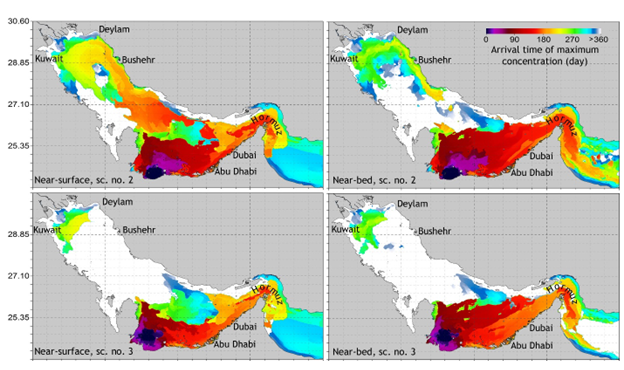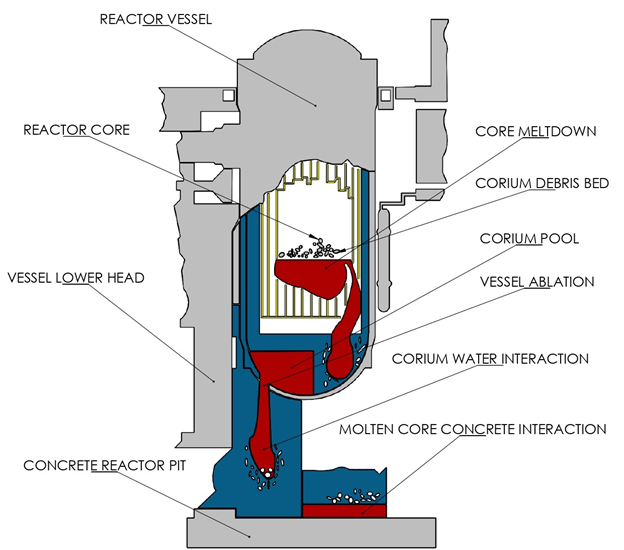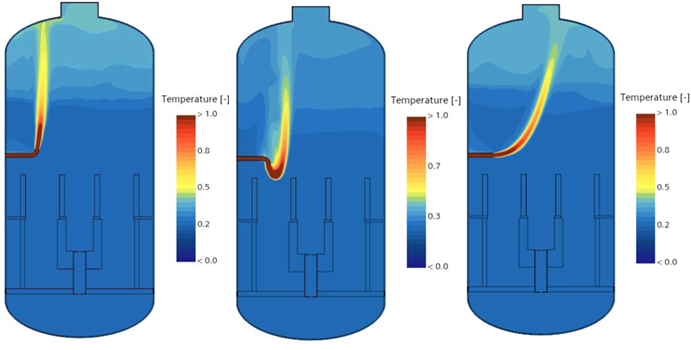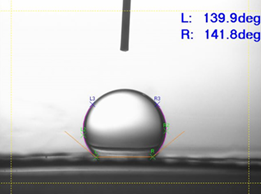- Admissions
- Academics
- Research Office
- Student Life
- News & Events
- Outreach
- About
Dr. Yacine Addad is the Deputy Director of the Emirates Nuclear Technology Center (ENTC) and Professor in the Mechanical and Nuclear Engineering Department at Khalifa University, UAE. An expert in nuclear thermal-hydraulics (T-H) analysis, he leads ENTC’s Theme-1 research team, focusing on assessing thermal hydraulic safety codes for simulating key T-H phenomena in nuclear power plants during postulated accident scenarios. Dr. Addad has contributed significantly to advanced reactor designs, including hybrid multiphase flow models and molten corium-concrete interaction studies.
Actively involved in UAE and international research programs, he has secured over $8.5 million in research funding from entities such as FANR, ENEC, UK funding councils, and ASPIRE. His work aligns with strategic goals such as decarbonization, addressing radionuclide dispersion, thermal energy storage, and reactor operational flexibility. With over 150 publications in refereed journals and conference proceedings, Dr. Addad has delivered invited lectures worldwide and earned national recognition for his contributions to nuclear research and innovation.

Morad Project: The primary objective of this project is to augment the United Arab Emirates' capacity to simulate the dispersion of radionuclides across marine, atmospheric, and continental environments, while meticulously considering regional and local characteristics. In light of the UAE's commencement of its nuclear program, marked by the construction of four nuclear power plants, the nation is earnestly dedicated to bolstering its human resource capabilities in the realm of nuclear safety. The present undertaking not only aligns with the overarching aspiration of diversifying the Emirate's economy but also serves to mitigate the impact of this newly embraced sustainable energy source on the natural environment.

ASPIRE Project: Molten Corium-Concrete Interaction (MCCI) is considered a significant concern due to its propensity to cause concrete ablation through the dissipation of heat from molten corium onto the concrete walls. Models for MCCI currently employed within numerical tools still harbor notable uncertainties, necessitating enhancements to reinforce the reliability of numerical predictions related to MCCI. In light of this, the present project intends to develop a numerical model grounded in a multi-physics computational fluid dynamics (CFD) framework. This model will be utilized to investigate the thermal behavior of molten corium and its consequential impact on concrete ablation during MCCI under severe accident conditions.

OECD-ATLAS-III Project: Following the successful participation of the KU team in Phase II of the OECD-ATLAS project, where they achieved significant safety analysis milestones through Validation and Verification (V&V) of the system code, FANR and Khalifa University continue their collaboration. They are now focused on implementing Phase 3 activities within the ATLAS project to produce numerical results for pre-test and post-test simulations. Additionally, this project aims to expand its scope by comparing two principal system codes, RELAP5 and TRACE, and by developing experimental capabilities at Khalifa University through the commissioning and opration of separate effect test facilities.

Heat Transfer enhancement by Nanoscale surface modification: This multidisciplinary research explores the innovative use of nanoscale textured surfaces, particularly nanoporous oxide layers, as a revolutionary solution to improve heat transfer processes in nuclear power plants. By leveraging low-wettability surfaces with nanoscale features, this study aims to enhance condensation and evaporation processes, critical for systems such as condensers, steam generators, and severe accident mitigation mechanisms like IVR-ERVC. Building upon the ENTC-Theme-2 project, the research focuses on experimental evaluations to optimize nanoporous structures for maximum efficiency and safety. This groundbreaking approach seeks to overcome the limitations of conventional boiling and condensation technologies, offering a commercially viable solution to extend operational lifetimes and improve the thermal efficiency of nuclear power plants.
Selected Publications:
[AY-2025] Fenouche R., Ouadha A., Addad Y. “Numerical analysis of flow boiling heat transfer characteristics of alternative refrigerants in minichannels,” Thermal Science and Engineering Progress, Vol. 63, 2025, 103701, https://doi.org/10.1016/j.tsep.2025.103701
[AY-2025] Albdour S.A., Osman S., Hassan M., Yoon H.-J., Afgan I., Addad Y. “Thermal performance analysis of reflux condensation in vertical tubes via pure steam” Exp. Comput. Multiph. Flow (2025). https://doi.org/10.1007/s42757-024-0234-x
[AY-2025] Osman S., Alnaqbi K., Addad Y. “Heat transfer correlations for curved downward-facing surfaces in forced and mixed convection regimes. Physics of Fluids, 37 (1): 015223. https://doi.org/10.1063/5.0250537
[AY-2024] Albdour S. A., Sharaf O. Z., Addad Y., “A critical review on the charging and transport dynamics of atmospheric radioactive aerosols: Fundamentals and advances”, Science of The Total Environment, Vol. 955, 177130, https://doi.org/10.1016/j.scitotenv.2024.177130
[AY-2024] Almazrouei, F.A., Addad, Y., Rodgers, P. “Numerical Study of Near-Field Radionuclides Dispersion Around Barakah Power Plant During Postulated Accidental Release Scenarios”. Arab J Sci Eng,, Special Issue, https://doi.org/10.1007/s13369-024-09734-8
[AY-2024] Khurshid I., Addad Y., Afgan I. “Study on corium-concrete interaction, heat transfer, and concrete ablation: Impact of replacing Zircaloy cladding with accident tolerant silicon carbide cladding on corium characteristics”, Applied Thermal Engineering, Vol. 243, 122569, https://doi.org/10.1016/j.applthermaleng.2024.122569
[AY-2024] Albdour S. A., Addad Y., Rabbani S., Afgan I. "Machine learning-driven approach for predicting the condensation heat transfer coefficient (HTC) in the presence of non-condensable gases," Int. J. of Heat and Fluid Flow, Vol. 106, https://doi.org/10.1016/j.ijheatfluidflow.2024.109330
[AY-2024] Osman S., Amidu M. A., Afgan I., Addad Y. "Experimental study of boiling heat transfer of inclined down-ward facing heated curved wall under low flow and pressure conditions", Applied Thermal Engineering, Volume 236, Part C, 121706, ISSN 1359-4311, https://doi.org/10.1016/j.applthermaleng.2023.121706
[AY-2024] Albdour S. A., Addad Y., Alyammahi N., Afgan I. “Steam Condensation Heat Transfer in the Presence of Noncondensable Gases (NCGs) in Nuclear Power Plants (NPPs): A Comprehensive Review of Fundamentals, Current Status, and Prospects for Future Research,” Int. J. of Energy Research, 2880812, https://doi.org/10.1155/2024/2880812
[AY-2023] Nesterov O., Addad Y., Bilal S., Bosc E., Abida R., Al Shehhi M. R., Temimi M. "A numerical assessment of the dispersion of dissolved pollutants in the Arabian Gulf associated with the Barakah nuclear power plant", Ocean Modelling, Vol. 186, 102274, ISSN 1463-5003, https://doi.org/10.1016/j.ocemod.2023.102274
[AY-2023] Amidu, M.A., Ali, M., Alkaabi, A.K. and Addad Y. “A critical assessment of nanoparticles enhanced phase change materials (NePCMs) for latent heat energy storage applications” Sci Rep 13, 7829. https://doi.org/10.1038/s41598-023-34907-0
[AY-2022] Amidu, M. A., Addad, Y. "The influence of the water ingression and melt eruption model on the MELCOR code prediction of molten corium-concrete interaction in the APR-1400 reactor cavity", Nuclear Engineering and Technology,54 (4), 1508-1515, https://doi.org/10.1016/j.net.2021.09.036
[AY-2022] Ayodeji A., Amidu M. A., Olatubosun S. A., Addad Y., Ahmed H., "Deep learning for safety assessment of nuclear power reactors: Reliability, explainability, and research opportunities”, Progress in Nuclear Energy, Vol. 151, 104339, https://doi.org/10.1016/j.pnucene.2022.104339
[AY-2022] Raj P., Padiyath N., Semioshkina N., Addad Y., Foulon F., Francis D., Voigt G., “Conceptualization of arid region radioecology strategies for agricultural ecosystems of the United Arab Emirates (UAE)”, Science of the Total Environment, Vol. 832, 154965, https://doi.org/10.1016/j.scitotenv.2022.154965
[AY-2022] Ali, M, Alkaabi, AK, Addad, Y. “Numerical investigation of a vertical triplex-tube latent heat storage/exchanger to achieve flexible operation of nuclear power plants”, International Journal of Energy Research, 46(3): 2970- 2987, https://doi-org.libconnect.ku.ac.ae/10.1002/er.7357
[AY-2022] Riahi, M.K., Ali, M., Addad, Y., Abu-Nada E., “Combined Newton–Raphson and Streamlines-Upwind Petrov–Galerkin iterations for nanoparticles transport in buoyancy-driven flow”, Journal of Engineering Mathematics, 132(1), 22, https://doi.org/10.1007/s10665-021-10205-4
[AY-2022] Amidu M. A., Olatubosun S. A., Ayodeji A., Addad Y., , "Severe accident in high-power light water reactors: Mitigating strategies, assessment methods and research opportunities", Progress in Nuclear Energy, Vol. 143, 2022, 104062, https://doi.org/10.1016/j.pnucene.2021.104062
[AY-2021] Amidu, M.A., Addad, Y., Riahi, M.K., Abu-Nada E., “Numerical investigation of nanoparticles slip mechanisms impact on the natural convection heat transfer characteristics of nanofluids in an enclosure”, Scientific Reports, 11, 15678. https://doi.org/10.1038/s41598-021-95269-z
[AY-2021] Nesterov, O., Temimi M., Fonseca R., Nelli. N.R., Addad, Y., Bosc E., Abida R., “Validation and statistical analysis of the Group for High Resolution Sea Surface Temperature data in the Arabian Gulf”, Oceanologia, https://doi.org/10.1016/j.oceano.2021.07.001
[AY-2020] Amidu, M.A., Addad, Y., M. K. Riahi “A hybrid multiphase flow model for the prediction of both low and high void fraction nucleate boiling regimes”, Applied Thermal Engineering, 178,115625, https://doi.org/10.1016/j.applthermaleng.2020.115625
Available vacancicies:
There are various PhD scholarship opportunities available at Khalifa for individuals interested in working on topics related to numerical and experimental thermal hydraulics, heat transfer, and single- or two-phase flows. Candidates interested in these opportunities can reach me at yacine.addad@ku.ac.ae.